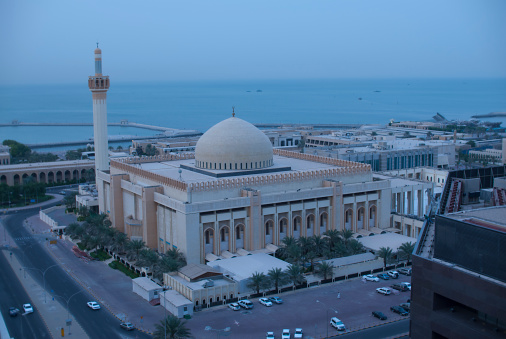Italy local time
Kuwait local time
Kuwait is a civilized country and everything essential to modern
comfortable living is available. Healthy food in plenty of variety,
clothing of latest design and fashion, house hold items from furniture
to electric accessories, cars, motor boats, toys, sports goods, in short
practically anything and everything from all over the world is imported
into Kuwait. The prices are also reasonable because the import duties
are very low.
Setting up a home in Kuwait is quite easy. Practically everything that
you may need for the home is available and shopping is quite convenient.
English is spoken in all the larger shops and communicating is not a
problem.
Food & Water
Most food is imported and subject to stringent testing by the Ministry
of Public Health. Shops are inspected regularly by the Ministry and,
provided normal domestic precautions are taken, the food in Kuwait is
quite safe to eat.
Kuwait’s water supply consists of distilled sea-water and is ‘soft’.
Water filters, which require regular cleaning or changing, are standard
fittings in most homes because, though the water is clean when it leaves
the pumping stations, impurities are sometimes picked up in the
distribution pipes. Water filters are commonly used to remove these
impurities, which makes the water perfectly safe for drinking and does
not need to be boiled. For the overcautious, mineral drinking water is
commonly available in 1.5 litre plastic bottles at a cost of 150fils or
so a bottle.
Furniture & Consumer Durables
The range of furniture available is vast and caters for all tastes
and price ambitions. New furniture, either fully-built or self-assembly,
is available in Shuwaikh and in the other main shopping areas. Credit
terms can be arranged. Furniture can also be rented.
With a constant turnover of expatriates there is plenty of second-hand
furniture around for sale. This is usually advertised by word-of-mouth
or in the daily newspapers and free weekly advertising tabloids. Used
furniture can also be bought at the Friday open air markets, and during
the week at the second-hand market near the nurseries at Al-Rai on the
4th Ring Road.
A wide range of TV’s, videos, stereos, refrigerators, micro-waves and
other consumer durables are available from all the main Japanese,
Korean, American and European manufacturers at reasonable prices.
Kuwait’s TV system is on the PAL standard but most of the TVs sold in
the country are ‘multi system’.
Clothing & Decorum
There is a wide variety of cloth and dress material available.
Readymade clothing in Kuwait ranges form cheap quality items to very
expensive designer couture. Styles reflect the multinational nature of
Kuwait’s population.
Tailors and dressmakers abound. Materials are plentiful and reasonably
priced.
Laundry and dry-cleaning services are fairly plentiful.
Though Kuwaitis are by and large liberal and broad-minded, Islamic
traditions dictate clothing decorum. Beachwear, worn by either sex, is
strictly for the beach or home and will cause offence in the suqs and on
the street. Even without the traditional black aba (cloak), the
fashionable clothes worn by Kuwaiti ladies will not reveal shoulders and
upper arms and usually stretch down to mid-calf at least. Formality of
dress at work varies among different companies and occupations in
Kuwait, but styles are always modest.
Religious Worship
There are over 800 mosques in Kuwait. Members of other faiths have
freedom of worship and there are quite a few Christian churches in the
country. Kuwait’s Catholic cathedral is in Watya (near the Sheraton
Hotel), and next to it there is a Coptic church, and about a block away
a Presbyterian church. There is an Orthodox Church in Co-operative
Street in Salwa (opposite the Universal American School), and in Ahmadi,
a Catholic church and an Anglican church.

Marriage
Where a marriage involves a Muslim male, the couple are required to
go to the Marriage Section, in the Ministry of Justice (Courts Complex -
Al Rigaii Area) to legalize their marriage contract. Each of the couple
must produce proof of their capacity to marry. Other documents required
are copy of passports and civil ID cards. Two male witnesses are
required. The marriage contract is signed and the exchange professed in
front of a qadi (judge). The Marriage Section (tel:882200) is open
8:30am to 1:30pm Sunday to Thursday. Stamp charges are KD1.
Christians must get married in church and then have their marriage
certificate attested at the Notary Public Department at the Ministry of
Justice in the Ministry Complex on Soor Street. A form of civil marriage
is also available in the Notary Public Department, on Sundays and
Wednesdays only. Expatriates need to bring along two witnesses plus a
certificate from their embassy showing their capacity to marry, or other
evidence such as validated divorce certificates, as well as their
passports and civil IDs. Stamp charges are KD1.
The attested marriage contract is in Arabic. Couples wishing to register
the marriage in their own country usually need to take the contract to a
government licensed office for translation and then to the Ministry of
Justice for authentication before taking it to their embassy for
registration. Couples married outside Kuwait must have their marriage
certificates attested by their embassy in order to use the certificate
for legal purposes.